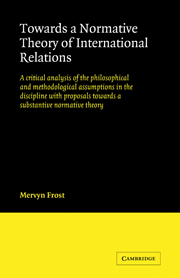 Towards a Normative Theory of International Relations
Towards a Normative Theory of International Relations Introduction
Published online by Cambridge University Press: 05 March 2012
Summary
One very striking feature of the modern discipline of international relations is that in spite of the fact that most scholars within the discipline claim to be motivated by an urgent moral concern for the well-being of the world polity, there has been very little explicit normative theorizing about what ought to be done in world politics. Most scholars have sought to provide explanatory theories rather than normative theories and, indeed, this is taken to be the hall-mark of international relations as a “scientific” discipline. They have sought to explain why wars occur, how international organizations operate, how growing economic interdependence affects the traditional international order, and so on. Yet they have for the most part avoided theorizing about how the world ought to be arranged; they have avoided such questions as: “When is war justified? When is intervention in the domestic affairs of other states justified? Is international terrorist activity ever justified? Is the policy of nuclear deterrence morally defensible? Is the system of sovereign states morally preferable to some sort of world state?” Key questions then are: “Why is it that within a discipline founded on such moral concern there is such a dearth of normative theory?” and “Are the reasons for this lack of normative theory good ones?” Part One of this book will seek to answer this question. The aim will be to evaluate critically the main reasons for the dearth of normative theory within the discipline of international relations.
- Type
- Chapter
- Information
- Towards a Normative Theory of International RelationsA Critical Analysis of the Philosophical and Methodological Assumptions in the Discipline with Proposals Towards a Substantive Normative Theory, pp. 1 - 6Publisher: Cambridge University PressPrint publication year: 1986
